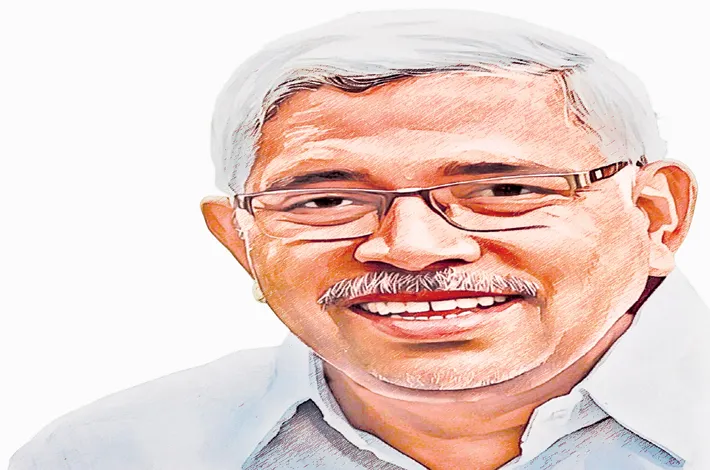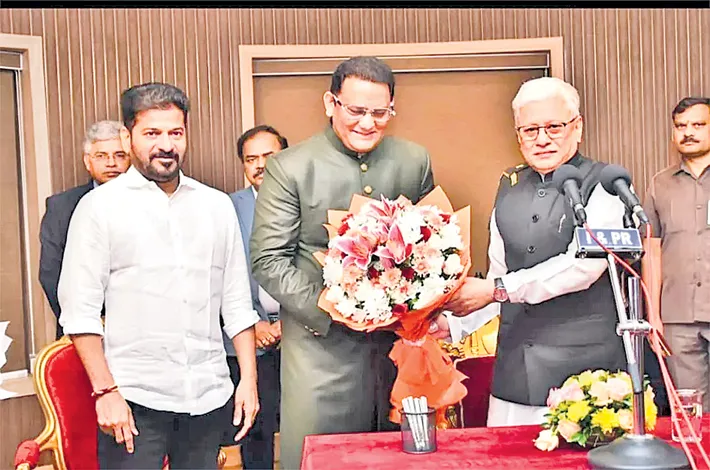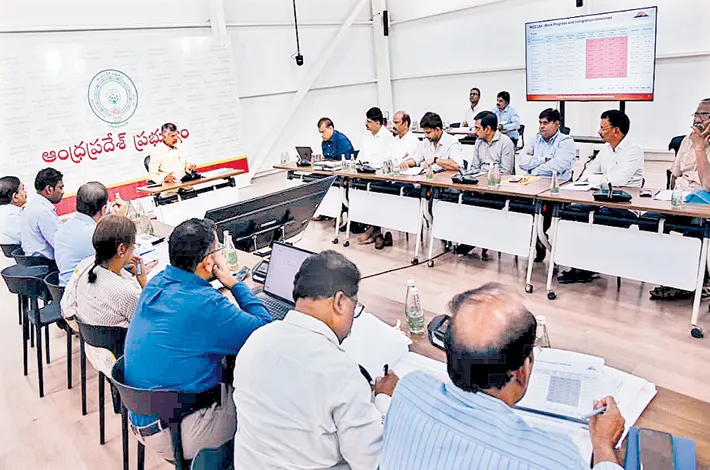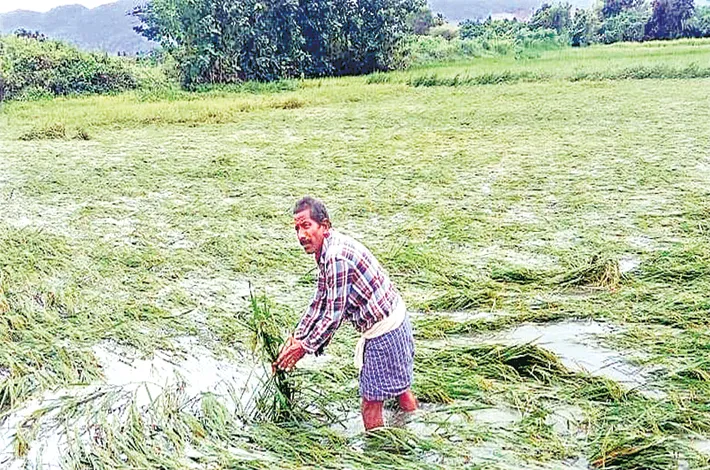A Monsoon Melody
14-07-2025 12:00:00 AM
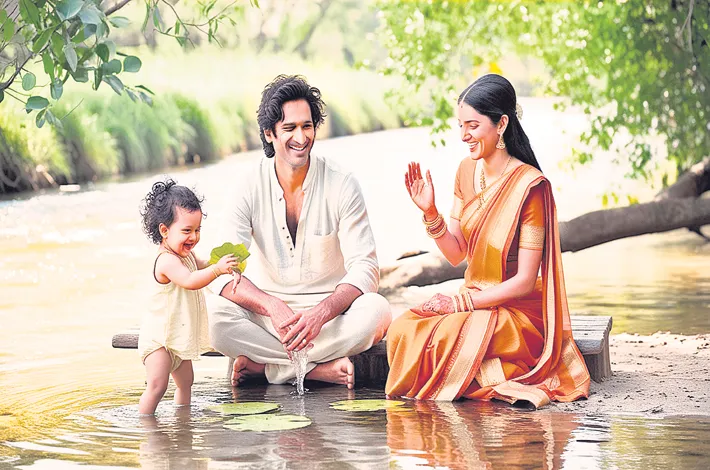
In the quaint village of Chanderi, nestled among the lush hills of Madhya Pradesh, the monsoon arrived with a flourish, draping the landscape in a shimmering veil of rain. The air was thick with the scent of wet earth, and the rhythmic patter of raindrops on tin roofs was a symphony that stirred the soul. It was here, in the heart of the monsoon, that Arjun and Meera’s love story began to unfold, inspired by the tender romance.
Arjun was a weaver, his fingers deftly threading vibrant silks into intricate sarees that told stories of tradition and beauty. His small shop, adorned with bolts of fabric in every hue, was a haven for the villagers. Meera, a schoolteacher from the city, had come to Chanderi to escape the chaos of urban life and find solace in the simplicity of the countryside. Her arrival was like a breeze, stirring the quiet village with her laughter and curiosity.
Their first meeting was serendipitous, under the banyan tree by the village square, where Meera sought shelter from a sudden downpour. Arjun, carrying a bundle of freshly dyed cloth, noticed her struggling to keep her books dry. Without a word, he offered her his umbrella, its bright red canopy a stark contrast to the grey sky. Meera’s eyes, a deep brown that mirrored the earth after rain, met his, and a shy smile passed between them.
“Thank you,” she said, her voice soft yet clear, like the chime of temple bells.
“It’s nothing,” Arjun replied, his heart skipping a beat. “The rain here is unpredictable, but it always brings something new.”
That brief encounter lingered in their minds, and soon, their paths crossed again at the village fair. Meera, draped in a simple cotton saree, was drawn to Arjun’s stall, where his hands worked magic on a loom. She watched, mesmerized, as he wove threads into patterns that seemed to dance. They talked—first about the sarees, then about life, dreams, and the beauty of Chanderi’s monsoons. Arjun spoke of his love for the craft, inherited from his father, while Meera shared her passion for teaching and her dream of writing a book inspired by the stories of the village.
As days turned into weeks, their meetings became a ritual. They would walk along the Betwa River, its waters swollen with monsoon rains, sharing stories under the shelter of ancient trees. Arjun found himself captivated by Meera’s intellect and warmth, while Meera admired Arjun’s quiet strength and the artistry in his hands. Their bond grew, delicate yet profound, like the threads he wove.
But love, like the monsoon, was not without its storms. Meera’s family, rooted in the city’s modern ways, disapproved of her growing attachment to a village weaver. They urged her to return to Delhi, where a “suitable” match awaited—a man with a stable job and a city address. Meera, torn between her heart and her family’s expectations, felt the weight of their disapproval. Arjun, too, faced whispers from the village elders, who believed Meera’s urban upbringing made her an outsider, unfit for their traditions.
One evening, as the rain fell in sheets, Meera sat by the river, her heart heavy. Arjun found her there, his face etched with concern. “Meera, what’s wrong?” he asked, sitting beside her, unmindful of the mud staining his kurta.
“They want me to leave,” she confessed, her voice trembling. “They think this—us—is a mistake.”
Arjun’s eyes softened, but his voice was steady. “Do you think it’s a mistake?”
Meera looked at him, raindrops clinging to her lashes. “No,” she whispered. “But I don’t know how to fight for this.”
Arjun took her hand, his touch warm despite the chill of the rain. “Then let’s fight together. Love isn’t just a feeling, Meera. It’s a choice, every single day.”
Inspired by his words, Meera resolved to stay, but the path ahead was not easy. Her family sent her cousin, Vikram, to Chanderi to persuade her to return. Vikram, charming and worldly, tried to sway Meera with promises of a comfortable life. Yet, as he spent time in the village, he saw the depth of Arjun and Meera’s bond—the way Arjun’s eyes lit up when Meera laughed, the way Meera’s stories inspired Arjun’s designs. Slowly, Vikram’s skepticism gave way to respect, and he became their unlikely ally.
The turning point came during the village’s annual monsoon festival, where Arjun unveiled a saree he had woven for Meera—a masterpiece in shades of blue and green, inspired by the river and the rain. As Meera draped it over her shoulders, the villagers gasped at its beauty, and Arjun spoke, his voice carrying over the crowd. “This saree is my heart,” he said, looking at Meera. “And it belongs to her.”
The crowd fell silent, then erupted in applause, their doubts melting away. Meera’s eyes brimmed with tears as she stepped forward, taking Arjun’s hand. “I choose you,” she said, her voice unwavering. “Today and every day.”
Vikram, witnessing this, promised to speak to Meera’s family, convincing them of the sincerity of her choice. Over time, they relented, moved by the couple’s unwavering love. Arjun and Meera married under the same banyan tree where they first met, the monsoon blessing them with a gentle drizzle. Their life together was woven with the same care as Arjun’s sarees—each thread a moment of joy, struggle, and love.
Years later, Meera’s book, Monsoon Threads, became a bestseller, telling the story of a weaver and a teacher whose love defied conventions. As they sat by the river, now with their young daughter splashing in the shallows, Arjun smiled at Meera. “The rain brought you to me,” he said.
“And it will always keep us together,” Meera replied, her hand in his, their love as timeless as the monsoon itself.





